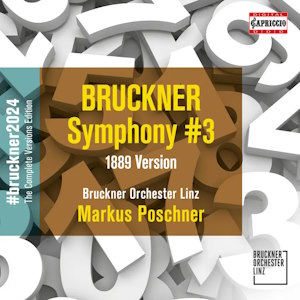
Anton Bruckner (1824-1896)
Symphony No. 3 in D minor (1889 version, ed. Nowak)
Bruckner Orchestra Linz/Markus Poschner
rec. 2023, Rehearsal Hall, Musiktheater, Linz, Austria
Capriccio C8088 [47]
Markus Poschner is recording three versions of Bruckner’s Third Symphony as part of his Bruckner2024 series: the original 1873 version has already been issued, this is the final, 1889 revision and the 1877 revision plus the discarded 1876 Adagio are yet to be issued.
This was the most popular and performed version before the rehabilitation of the original and as with his recording of the latter, Poschner opts for notably fast tempi; despite having greatly enjoyed several issues in this series, I did not like that 2022 recording at all and wrote a damning review, indeed dubbing it “the worst recording of a Bruckner symphony I have ever heard”. Perhaps my reaction was rather extreme, but I have a special affection for this symphony and could not bear to hear its beauties so violated.
Unfortunately, just a glance at the timings confirms that Poschner has applied the same temporal strictures to this performance. At just over 47 minutes, he is overall ten minutes faster than celebrated recordings by Karajan, Skrowaczewski and Jansons, while the likes of Sanderling and Wakasugi take even more time over it – and I discount here comparison with more eccentric but respectful accounts by such as Ballot and Celibidache; to my ears such haste is simply perverse in its bid for attention.
I was of course this time prepared for that approach so less surprised but no less disappointed; obviously this is how Poschner believes this work should go. I am a reviewer – a lower form of musical life – and he is an eminent conductor whose work I often admire, but there it is – I do not like its haste. The playing is nonetheless very good and there is no denying that the vision is consistent, but I cannot get over the trivialising of the repeat of the main theme at 7:11 in the first movement which scurries down like a frightened rabbit into its burrow – yet the brass fanfare at 8:42 is quite imposing, despite the fast tempo. The Adagio is prosaic and does not engage me as more sensitive accounts do.
The propulsive nature of the Scherzo renders it immune to undue urgency but let it be noted that Poschner’s is the fastest on record alongside a somewhat obscure recording by Hartmut Haenchen on Denon in 1989 and the same complaint I made about the lack of differentiation in tempo between the outer sections and the Trio applies. To be fair, only the earlier score specifies the same tempo for all three sections but I do not think it works well here, musically. The finale is, undeniably, breathlessly exhilarating, but that same lack of contrasts between section vitiates Bruckner’s concept. I will not belabour my points; you get the picture.
The sound is better engineered than on the recording of the 1873 version which had a different orchestra, venue and recording engineer from this but I cannot endorse this traversal of the Third unless you share Poschner’s predilection for Brucknerian briskness.
Ralph Moore
Help us financially by purchasing from




















